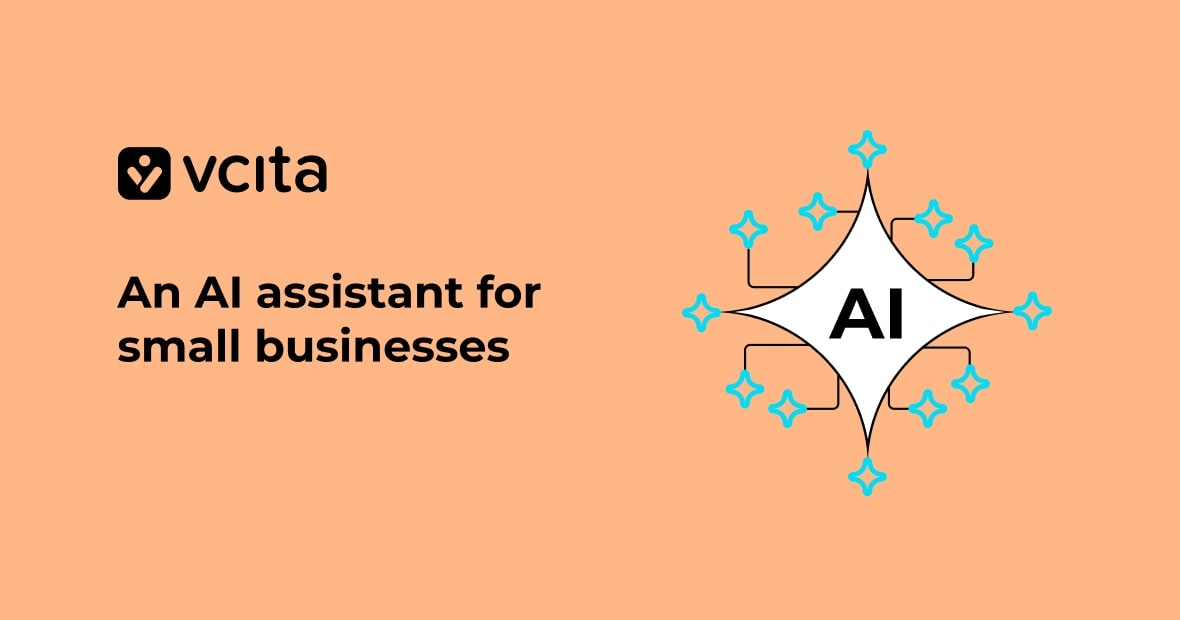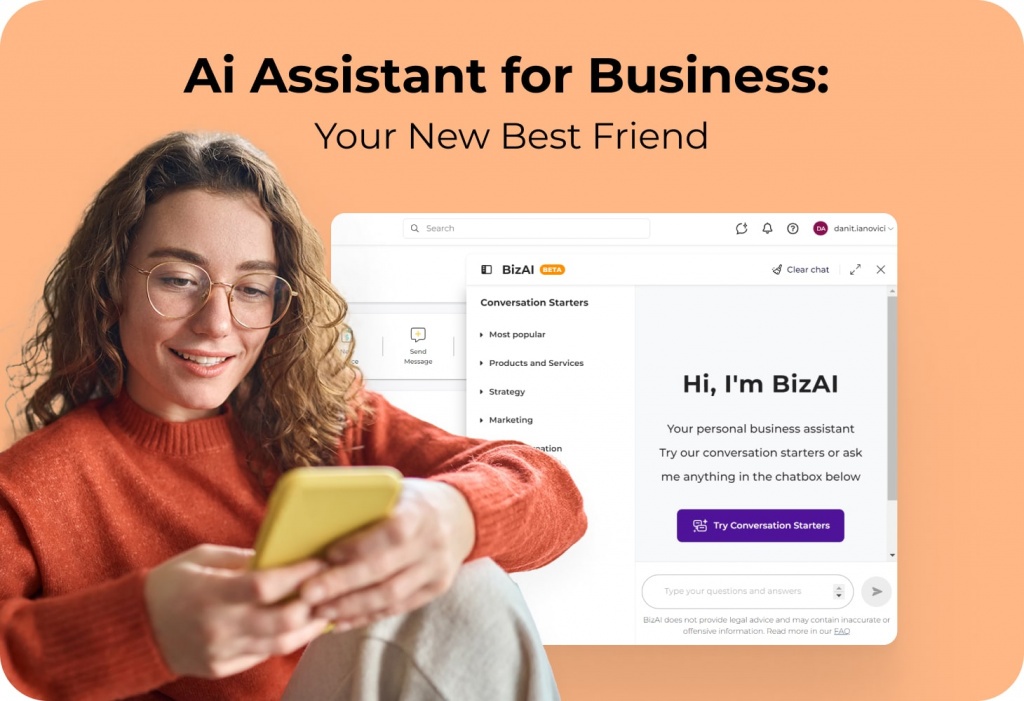When you’re a small business owner, you have a million things to do at any given moment. You wish you could clone yourself so you could get more done at the same time. Although cloning is still out of reach for now, you can get an AI business assistant that’s ready to help with customer service, answering questions, content creation, and more using machine learning (ML) and artificial intelligence (AI).
This personalized assistance can handle many business tasks, thanks to voice commands, generative AI, and the latest AI technology. Read on to discover the possibilities of an AI business advisor.
Introducing AI business assistants
AI business assistants are software powered by artificial intelligence (AI) that can handle many time-consuming tasks for small business owners. Think of them as virtual employees that are available 24/7 to help with various business needs.
Affordable AI tools for small businesses
While large companies have been using AI for years, the technology is now accessible and affordable for small businesses. AI business assistants can take the form of:
- Standalone software services
- Integrated features in existing platforms like CRMs, helpdesks and website builders
- Voice assistants that work with smart home devices
- Mobile apps with conversational interfaces
With AI technology more advanced and economical than ever, small business owners can benefit from personalized assistance and automation like never before.
How AI assistants can transform your business
As a small business owner, you wear many hats. Between managing day-to-day operations, serving customers, and handling marketing, it’s hard to find time to grow your business. Here are some of the ways that an AI business assistant can lift some of the burden from your shoulders, so you can focus on the big picture.
Save time with AI assistants
AI assistants can save you hours of work each week by automating repetitive and routine tasks like:
- Answering customer questions through chatbots on your website or social media
- Generating social media content, blog posts, and email newsletters
- Searching the web and providing recommendations
- Completing data entry and paperwork
With voice commands or simple text, you can delegate these tasks to your AI assistant and get back to focusing on growing your business.
Personalized help when you need it
AI business advisors get to know your company and customers to provide a personalized experience. By analyzing data from your website, social media, and customer interactions, AI tools can learn your customers’ needs, interests, and pain points. They can then tailor content and customer support responses to match. Over time, AI assistants become more useful as they gather more data and insights.
Always available
Unlike human employees, AI business advisors are available 24/7. They can handle customer support requests, update your social media, and carry out other tasks even when your business is closed. For customers, this constant availability provides a good experience and conveys that you care about their needs. For you, it means peace of mind that critical business functions will continue running smoothly at all hours.
The key benefits of leveraging AI assistants
AI assistants for business are designed to offer a personalized experience for you and your customers. They can handle many routine tasks so you have more time to focus on growing your company. Here are some of the main benefits of using an AI assistant for your small business.
- Improve customer experience
AI powers an enhanced customer experience. Chatbots and voice assistants provide quick responses and solutions for your customers. They can also personalize experiences by remembering details about individual customers and their past interactions with your business. Personalized service and fast response times lead to higher customer satisfaction and loyalty.
- Gain data-driven insights
AI tools like machine learning and predictive analytics help you gain valuable insights from all the data in your business. An AI assistant can analyze trends in your sales, web traffic, social media, and more. It detects patterns that would be nearly impossible for humans to uncover on their own. You can use these insights to optimize marketing campaigns, improve products, and make better business decisions. AI provides a competitive advantage by enabling data-driven strategies.
- Free employees for other tasks
AI chatbots and voice assistants can handle common customer service inquiries and questions. They are available 24 hours a day, 7 days a week to respond to customers instantly. This can release employees to focus on work that drives revenue, or to give more attention to complex issues that AI chatbots can’t handle. Additionally, solutions like the AI-powered SDR agent from Luru can enhance sales processes by automating lead qualification, follow-ups, and engagement, allowing sales teams to focus on closing deals and high-value interactions
AI assistant use cases for small businesses
There are a number of ways that small business owners can use AI assistants so as to benefit from increased time and fewer costs. Here are the 4 main top use cases for AI business assistants.
- Help with customer service
As a small business owner, customer service is crucial but time-consuming. An AI chatbot can handle common questions 24/7 via voice commands or text, freeing you up to focus on more complex issues. With natural language processing, AI tools like Google Assistant or vcita’s AI Business Advisor understand customers and respond helpfully. They get smarter over time by using machine learning to analyze interactions.
- Personalized assistance
AI assistants can provide personalized help for you and your customers. Using AI technology like machine learning and natural language processing, assistants learn about your business, products, services, and customers to provide tailored recommendations and answers. They can anticipate needs, suggest relevant content or products, and streamline the customer experience.
- Content creation
Generating content is important for SEO and social media, but requires a major time investment. AI writing assistants use natural language generation to quickly produce draft blog posts, social media updates, emails and more based on your input. You simply provide a topic or headline and the AI generates a draft for you to review and customize as needed. This allows you to produce more content to reach your audience without sacrificing quality.
- Productivity boost
As smart home devices and AI continue to advance, small businesses can take advantage of artificial intelligence for productivity. AI scheduling assistants can manage appointments, tasks and notifications to keep you on track. Voice commands provide a convenient way to set reminders, schedule meetings or dictate messages hands-free while multitasking. AI tools integrate with many apps and services you already use, to minimize disruptions to your workflow.
Choosing the right AI assistant for your needs
An AI business advisor can help lighten your workload by handling routine tasks so you can focus on growing your business. But with many options available, how do you choose the right AI assistant for your needs?
Understand the 3 types of AI assistants
There are a few different types of AI assistants available. You might need one specific type more than others, or all of them at different times.
- Chatbots
Chatbots can handle basic customer service tasks like answering questions, providing information, and accepting payments or orders via voice commands or text chat. They use machine learning and natural language processing to understand requests and provide appropriate responses in real time.
- Writing assistants
Writing assistants can generate content like blog posts, social media updates, newsletters, and more. They analyze your audience, industry, and competitors to produce personalized, high-quality content. Some writing assistants even suggest content ideas to keep you active on social media and search engines.
- Smart home management devices
Smart home devices let you control functions in your business via voice commands. You can adjust the thermostat, turn on/off lights, play music, set reminders, and more. They tap into AI technology with machine learning to understand your commands and provide helpful responses.
7 key features to consider when investing in an AI assistant
When comparing AI assistants and the different features on offer, check out these key issues:
- Purpose. Choose an AI tool tailored to your needs, whether it’s customer service, content creation, data analysis, or automation.
- Capabilities. AI assistants range from basic automation of repetitive tasks to highly advanced tools. Make sure the features match your requirements.
- Cost. Pricing varies depending on the AI technology and capabilities. Subscription models are common, ranging from free to monthly fees. Consider how much you can budget for an AI assistant.
- Compatibility. Choose an AI assistant that works with your existing software and tools. Some integrate with popular platforms like Google Assistant, Slack, and Zapier.
- Customization. Look for an AI assistant that can be personalized to your brand and business needs. Some allow you to customize the interface, voice, and more.
- Support. Consider the level of customer support offered. Some providers have 24/7 support in case you run into issues.
- Security. Review the security and privacy offered to ensure your data and communications remain private.
With many options to choose from, take time to evaluate different AI assistants based on your key requirements. The right AI tool can save you time, boost productivity, and enhance your customer experience. But be sure to choose a solution tailored to your business needs and budget.
An AI business assistant could transform your business management
Leveraging AI for your small business is a smart investment that pays off through increased productivity, reduced costs, improved customer experiences, and data-driven decisions. An AI assistant becomes an invaluable partner, working behind the scenes to support your success. While AI cannot replace human judgment and relationships, it enhances your capabilities and allows you to focus on the most meaningful work. With an AI business advisor handling routine and repetitive jobs, you can shift your focus to high-value tasks that drive real growth.





























